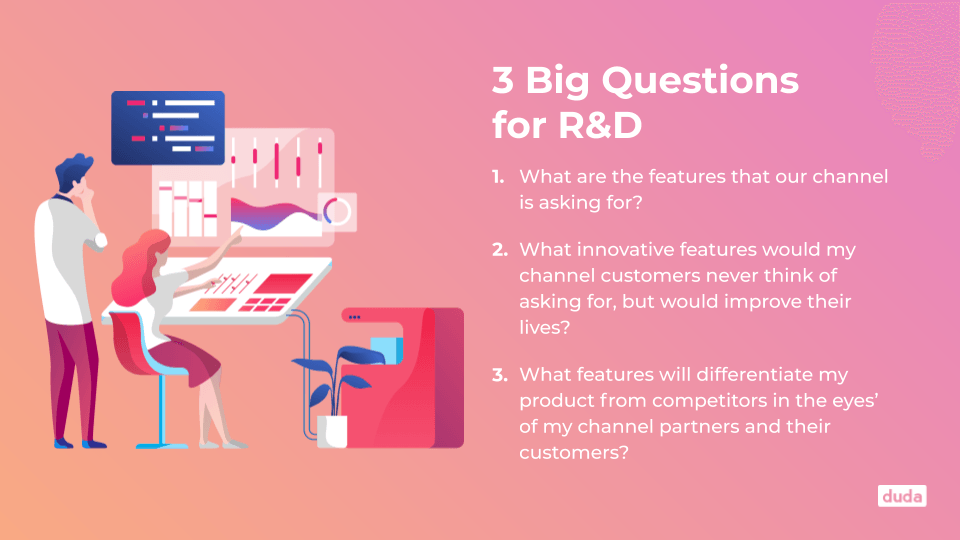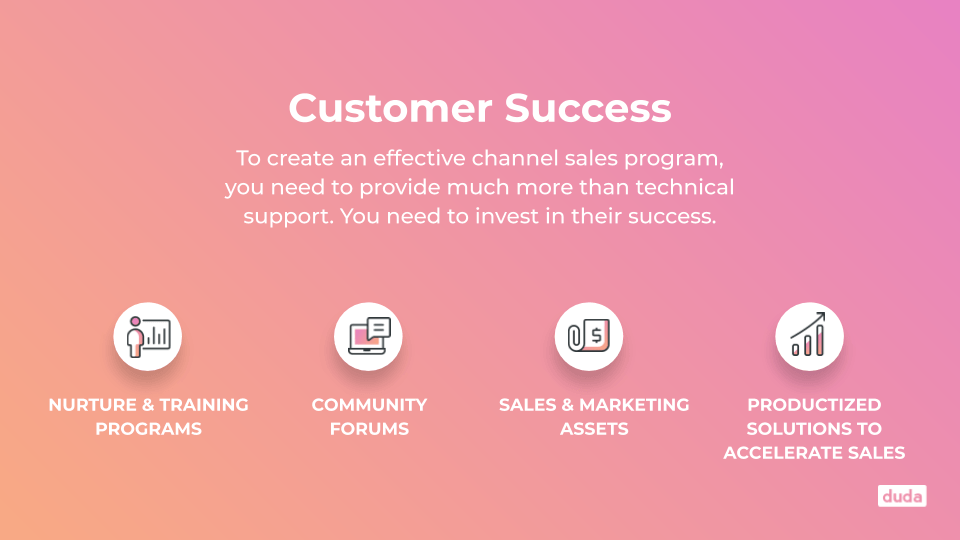Over the years, Duda has partnered with almost every type of web professional you can imagine. From freelance designers to digital marketing agency owners and VPs of product at SaaS companies, there are very few business models we haven't worked with on our way to becoming one of the leading website builder platforms on the web.
Interestingly, this experience has placed Duda at a vantage point that offers a close-up view of what does (and doesn't) help web professionals grow their businesses.
Undoubtedly, one of the most effective ways for digital marketing professionals to grow their businesses and bottom lines is to create an indirect sales channel of some kind in which the Duda partner takes on a (primarily) fulfillment and support role, while leaving frontline sales to another organization or individual.
How Duda Created an Indirect Sales Channel
If you've been using Duda to build websites for a while, you may be aware that our company wasn't always focused solely on serving web professionals. In fact, there was indeed a time when Duda served small businesses much more directly by offering a mobile website conversion tool that only required a few clicks to make a desktop website mobile-friendly. However, as dedicated web professionals, there was a certain point at which we realized our real passion was building design tools for other web professionals. And with this new mission came a new way of selling websites — indirect sales channels.
Since making this transition, Duda has also seen a variety of partners — including digital marketing agencies of all sizes — pivot or expand their organizations to support an indirect sales channel of their own.
An Indirect Sales Channel Can Take a Company-Wide Paradigm Shift
As a general rule, realigning an organization's mission doesn't happen overnight. However, if you're going to set up an indirect sales channel that is intended to bring a significant amount of revenue into your business, it may be required.
At Duda, our transformation from an SMB-centric website builder into a web design platform for web professionals changed the game for every department at Duda, including:
- Marketing
- Research & Development
- Customer Success
- Sales
Though we went through specific transformations in these areas at our company to reconstitute Duda to better serve web professionals, you can assume if you're opening a serious indirect sales channel, you'll have to make similar decisions.
The Impact of an Indirect Sales Channel on marketing
One of the major things you have to understand when switching from a direct sales model to opening up a successful indirect sales channel is your target customer changes in a very essential way. Your mission is no longer just about creating a great product for end users and selling on that value proposition. You have to start thinking about how you can enable your customer to sell more and make those areas your main unique selling propositions (USPs).
For example, when Duda switched from an SMB focus to a web professional focus, marketing underwent the following changes;
- Expanded our understanding of web pros and their pain points
- Tone of messaging was upgraded to reflect skill sets of web pros
- Segmentation of channel partners into different tiers
Though it's highly unlikely your business would go through the exact same metamorphosis, it can be expected that you would at least need to expand your understanding of the partners/customers selling your product and double down on messaging about how you offer everything needed to offer amazing websites to SMB clients.
The impact of An indirect sales Channel
on your developers
One of the truly awesome things about Duda's platform is how flexible it is for developers and designers. The platform is entirely
white labeled and, thanks to our custom widget builder and robust API, you truly can make the platform work the way you do.
If your goal is to set up an indirect sales channel for independent sales teams, contractors or affiliates, you'll want to spend some time building out your Duda instance to make sure it provides them with everything they need to sell to customers. This may entail creating certain vertical-specific widgets or integrations, streamlining your support to handle primarily product-centric queries and extensive use of
roles and permissions.
Here are three questions any product or R&D team should ask themselves before opening up an indirect sales channel:
- What are the features that our channel is asking for?
- What innovative features would my channel customers never think of asking for, but would improve their lives?
- What features will differentiate my product from competitors in the eyes of my channel partners and their customers?
THE IMPACT OF an INDIRECT SALES channel ON Customer success
When switching from a direct sales model to one primarily based around indirect sales channels, it's important to understand that customer success becomes more important to your success than ever.
Since you're no longer primarily taking care of website maintenance and marketing concerns through direct requests from SMB customers, its important to find a scalable way to enable your indirect sales partners to manage low-level customer requests on their own. This may entail creating PDFs, videos, webinars and other media (or taking advantage of white label assets provided by Duda). However, above all, supporting an in direct sales channel means focusing on customer education to help your partners sell more — what that actually looks like is up to you.
THE IMPACT OF an INDIRECT SALES channel ON Your sales team
Let's continue the thought experiment and assume you have re-worked or expanded your organization to offer website fulfillment and support services to other parties that are selling the actual websites to small businesses.
Like the rest of your company, this will have a significant impact on how your sales team operates.
Pounding the pavement and prospecting direct customers won't have the same effect as it may have had before.
Instead, you may consider switching to an inbound marketing strategy that involves leaning more on content creation to promote your work to other web pros. Connecting with trade organizations and attending conferences (when possible) is also a surefire way to meet potential indirect sales channel partners.
Summary
Setting up an indirect sales channel in some way may not work for every digital marketing agency or SaaS company, but it should at least be an option on the table. Depending on how far you want to take it, setting up an indirect sales channel can become quite the project, but, if done right, it may just pay off in the end.
So, think about it?










